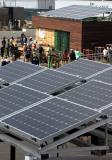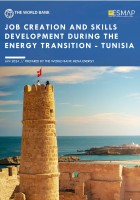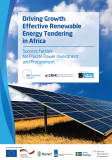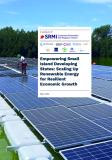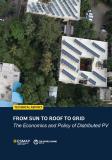Publications
Tunisia has chosen to embark on an ambitious energy transition to address the challenges of decarbonization, energy security, and vulnerability to volatile international energy prices. The national energy strategy, Stratégie énergétique de la Tunsie à l’horizon 2035 (Tunisia’s energy strategy to 2035 announced in February 2023) calls for the share of renewable energy in the primary energy mix to reach 18 percent by 2035; its share in the electricity production mix is to reach 50 percent by the same year. The country also aims to reduce primary energy intensity by at least 3.6 percent per year on average between 2021 and 2035. The new energy strategy is designed to create 70,000 jobs (direct, indirect, and induced) in all energy sectors, including biogas and hydrogen, between 2021 and 2035. If achieved, this can reduce the country’s high unemployment rate, especially among youth and women. The goal is about 20 times more job creation than in 2015, when energy efficiency and renewable energy programs created nearly 3,000 direct jobs in the country. The job creation process is part of a global transition from conventional to clean energy. New jobs specific to this clean energy transition require new skills, which will have to be acquired either through the university system or through vocational training. These new skills may also be required for existing jobs, the prerequisites of which are subject to change (transformed jobs). The energy transition may render some jobs in the conventional energy sector obsolete.
This report on Tunisia is one of three country case studies under phase 2 of the umbrella project, The Disruptive Energy Transition and Opportunities for Job Creation in the Middle East and North Africa. This project, made possible by funding from ESMAP and the Climate Support Facility, was initiated in 2019 in response to requests from various Middle East and North Africa governments to explore the nexus between the clean energy transition and employment.
Gazzo, Alexis; Robert, Jean-Gabriel; Decoopman, Camille; Dhiaf, Meryem Ben; Othmen, Mohamed Ben; Farhat, Sarra; Boukhachab, Sofia.
Job Creation and Skills Development During the Energy Transition : Tunisia (English). ESMAP Paper. Washington, D.C. : World Bank Group. http://documents.worldbank.org/curated/en/099011524131520481/P17054612bbe400361868c17299ac7f71df
